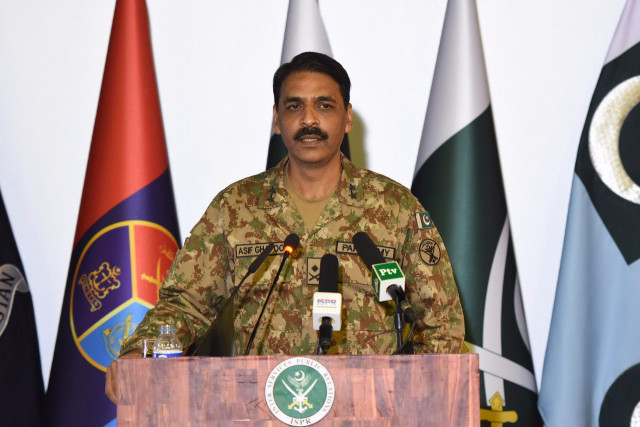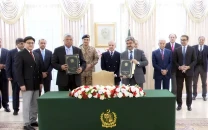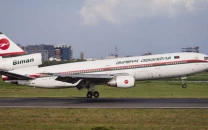Rangers deployment: Court fiasco doesn’t portend clash of institutions, says ISPR
Maj Gen Asif Ghafoor says ISI links not to incite violence but to bring groups to talks

In this file photo, DG ISPR Maj Gen Asif Ghafoor addresses a press conference in Rawalpindi. PHOTO: ISPR
The chief military spokesperson clarified on Thursday that the deployment of Rangers troops at the accountability court earlier this week was the result of lack of coordination between the law enforcement agencies and the civil administration.
At a press briefing, Major General Asif Ghafoor, the director general of the Inter-Services Public Relations (ISPR), said the ‘hype’ after the Rangers deployment must not be interpreted as a clash between institutions.
“It was an incident of lack of coordination at local level [but] received a tremendous hype,” he told reporters. “It does not portend a clash between state institutions. We need to improve this coordination and encourage a soldier rendering his duties.”
The paramilitary force was deployed at the Federal Judicial Complex on Monday, where deposed prime minister Nawaz Sharif appeared before the accountability court for hearing of corruption references against him.
The Rangers stopped media persons, senior politicians, including some cabinet members, from entering the premises. Later Interior Minister Ahsan Iqbal, who was also stopped by the Rangers, promised an inquiry into the incident.
Prime Minister Shahid Khaqan Abbasi also weighed in, saying that the controversial deployment of Rangers would be investigated and whosoever ordered the deployment of the paramilitary troops would be punished.
The ISPR chief said that when a military man or a policeman was deployed for security, they would not allow entry to anyone who did not have an entry card.
If Rangers found guilty, action will be taken against them: PM
“Even if the army chief does not have a card, he is informed by personnel that he is not allowed [to pass],” Maj Gen Ghafoor said. “We need to appreciate the personnel for their duty,” he said, adding the incident was dealt with in 10 to 15 minutes and “then the rest of the [PML-N] leadership went inside”.
Maj Gen Ghafoor dismissed rumors that the army was contemplating any unconstitutional step. “This should not be even talked of,” he said, adding the armed forces were committed to playing their role in line with the Constitution and the law.
Asked why no press release was issued after Tuesday’s special corps commanders conference, the military spokesperson said “silence is also an expression”.
He also spoke at length on issues of internal security as well as political controversies, as he faced a volley of questions about the political situation, especially the recent statements given by certain PML-N leaders.
Responding, the ISPR chief warned against falling prey to the anti-Pakistan narrative being built by the ‘hostile agencies.’ He said forces inimical to Pakistan’s growth and progress were deliberately targeting the armed forces and its institutions, including the Inter-Services Intelligence (ISI).
He said the enemies were giving the false impression as if the army or the ISI were not under the control of government. “If we fall prey to such narrative, there is real danger that our gains against terrorism and extremism could be reversed.”
Rift widens: Rangers withdraw security from parliament
When his attention was drawn towards a recent statement by Sharif about the fall of Dhaka and other tragedies, Maj Gen Ghafoor said Pakistan would not move forward “if we are stuck in the past”, adding: “So much has happened over the last 70 years… it is time to move beyond the past.”
At present, the military spokesperson emphasised, “we have to focus on the sacrifices we have rendered in the last 15 years to secure this country from the scourge of terrorism but also from enemy designs”.
When asked about allegations of harboring certain terrorist groups against Pakistan, he termed such insinuation as part of the narrative being propagated by the ‘hostile agencies’. He said there was no organised presence of any terrorist groups inside Pakistan as a result of a successful military campaign.
“We need to take this battle [against terrorism] to its logical conclusion. Finishing the job is often difficult,” he said, but added that with the support of the people and other state institutions, Pakistan would defeat the forces of terrorism and enemy designs.
When quizzed about the most-recent statement of the top American general that alleged that the ISI had links with terrorist groups, Maj Gen Ghafoor explained that ‘having links’ and ‘supporting any groups’ were two different things.
“Name any intelligence agency which does not maintain links with militant groups,” he asked. He went on to say that the purpose behind maintaining links with such groups was not to incite them to violence but to bring them on the negotiating table.
Calling the shots
He said Pakistan’s strategic importance in this part of the world was an “indispensable reality”. This is the reason, he added, many international and regional forces were competing for their respective interests. “Due to this reason, Pakistan faces increased threats both from its western and eastern borders.”
The military spokesperson told reporters that currently around 200,000 troops have been deployed along the Afghan border, while about 100,000 troops patrol the eastern front -- the border with India. He added Pakistan had to maintain the deployment along the western front since terrorist outfits, including the banned Tehreek-e-Taliban Pakistan (TTP) and others were posing a threat from across the border.
He described army chief General Qamar Javed Bajwa’s recent visit to Kabul as a step in the right direction. The visit, he said, helped create a positive atmosphere as there were no negative statements issued from both sides after the trip.
The ISPR chief announced that General Bajwa would soon visit Iran. He said that there was greater understanding between the two countries both at the political and military levels to deal with the common challenge of terrorism.
About the participation of some banned militant outfits in the by-elections, he said every Pakistani had the right to participate in the political process. He added there was a proposal under consideration by the government how to mainstream such groups. “This is an issue of the state.”
He also spoke about ceasefire violations by India on the Line of Control (LoC) and the Working Boundary. Indian forces committed a record number of ceasefire violations in 2017, he said. “India is doing all this as part of its hegemonic policies, to divert attention from its internal problems and suppress the political movement in occupied Kashmir.
Responding to another question, Maj Gen Ghafoor said the army chief would soon decide on the mercy petition filed by Indian naval officer-turned RAW agent Kulbhushan Jhadav, who has been sentenced to death for espionage, terrorism and subversive activities by a military court.



















COMMENTS
Comments are moderated and generally will be posted if they are on-topic and not abusive.
For more information, please see our Comments FAQ